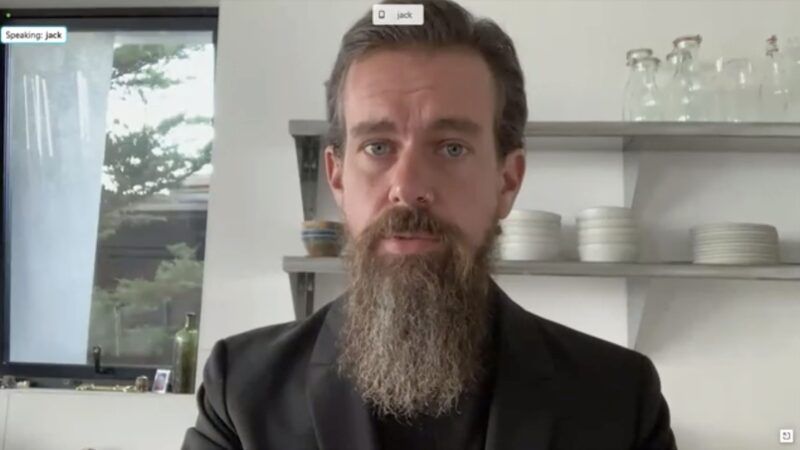Congress Grilling Tech Companies on COVID-19 Misinformation Is a Bit Rich
What about the federal government's own health experts?

There were a lot of ridiculous lines of questioning during Thursday's congressional hearing on social media misinformation, but one that jumped out as particularly hypocritical came from Rep. Mike Doyle (D–Pa.).
After grilling Facebook CEO Mark Zuckerberg, Google CEO Sundar Pichai, and Twitter CEO Jack Dorsey about their failure to eliminate misinformation on social media in general, Doyle turned to the subject of COVID-19. He asked each of the CEOs whether they believed the approved vaccines work. Each answered yes, of course.
"Then why have your companies allowed accounts that repeatedly offend your vaccine disinformation policies to remain up? " thundered Doyle, as if he has caught them in some kind of trap. "Why in the midst of a global pandemic that has killed over half a million Americans you haven't taken these accounts down that are responsible for vaccine disinformation?"
Zuckerberg, Pichai, and Dorsey responded that they do take down COVID-19 misinformation, though there are grey areas where something may not be provably true but is a matter of personal opinion, and the platforms are ill-suited to police all of this. This was a fine answer, but if they were feeling more combative, they could have turned the question on the congressmen: Why, in the midst of a global pandemic that has killed more than half a million Americans—and is still killing more than 1,000 people every day—is the federal government contributing to vaccine hesitancy and unavailability?
Officials at the Food and Drug Administration (FDA) have yet to approve the AstraZeneca vaccine—30 million doses of it are just sitting in a warehouse in Ohio—even though data from the company's trials have showed that the vaccine is very effective at preventing severe disease and death from COVID-19. Not a single vaccinated person in the trial was even hospitalized. The vaccine should be distributed immediately, or at the very least sent abroad in order to confront the out-of-control pandemic in places like Brazil and Ukraine.
The government hasn't just failed to release the vaccine to the public; it has undermined confidence in it. Officials representing the National Institutes of Health (NIH)—including White House pandemic expert Anthony Fauci and NIH chief Francis Collins—have publicly feuded with AstraZeneca over a statistically insignificant discrepancy in the vaccine's reported efficacy.
Moreover, public health officials have repeatedly undersold the vaccines by insisting that Americans continue masking and social distancing even after they receive their shots. For younger people whose well-being is not particularly threatened by the disease, a major incentive for getting vaccinated is the opportunity to resume normal life. But officials still recommend very small gatherings, masks (even outdoors), and heavy restrictions on schools that reopen.
Government health experts have also changed their minds repeatedly about various mitigation strategies over the course of the pandemic. A year ago, Fauci recommended that people not bother purchasing masks unless they were in a health care setting. The Centers for Disease Control (CDC) has changed its mind about whether three feet or six feet is enough space for social distancing. Some of these mistakes are understandable: This was a never-before-seen disease. But it's absolutely the case that the federal government has repeatedly misinformed the American public about a variety of topics related to COVID-19, including the unlikelihood of post-vaccine transmission.
It thus seems misguided for Congress—a body with very little authority to dictate private social media companies' terms of service but considerable power to hold public health agencies to account—to fixate on tech companies' role in spreading COVID-19 misinformation. Thousands of people are still dying every day because the U.S. government isn't letting its citizens be vaccinated fast enough, and lawmakers seem more interested in finding a way to blame this on Facebook.


Show Comments (86)